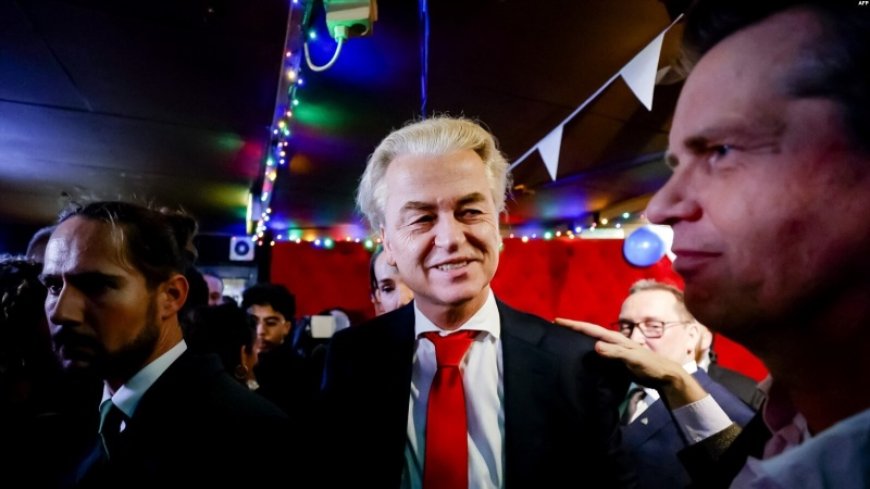Hard-right victory in Dutch election; alarm bell for Europe
The Dutch general election was held on Wednesday, November 22 in the country to determine who will lead the next government that should take power in the country after the departure of Mark Rutte, who has been the prime minister for 13 years.

The preliminary results after voting for the Dutch parliamentary elections show that the radical party "Party for Freedom" led by Geert Wilders has won the election. The party has won 35 seats. The Left Alliance has won 26 seats and the "People for Freedom and Democracy" party has won 23 seats. However, the "For Freedom" party could not win an absolute majority of seats. If the results of counting the votes continue in the same way and Geert Wilders with extreme views of extreme right-wing to get the majority of seats, he will have to form a coalition with other parties to form a government. In that case, the anti-fee candidate will replace Mark Rutte, the current prime minister of the Netherlands. Geert Wilders said on Wednesday night that: "The Dutch hope that they will be able to take their country back and we will make sure that the tsunami of migrants and asylum seekers will subside."
While calling on other parties to cooperate for the creation of a coalition government, he said his party cannot be "ignored" anymore. The "For Freedom" party is among the extreme right-wing political parties that oppose immigrants and Islam in the Netherlands, and its victory could have a major impact on the country's relationship with the European Union. The party has managed to attract the attention of the Dutch with anti-immigration slogans. The issue of immigration has been one of the most important and challenging issues in the election campaigns in the Netherlands, which led Mark Rutte, who has the record of the longest-lasting government in the country's history, to not run for re-election. Geert Wilders The victory of the right-wing politicians in the Dutch parliamentary elections has once again sounded the alarm for the European Union, which is fighting for greater solidarity among European countries, thus increasing the possibility of the collapse of the European institution.
The pro-democracy party "For Freedom" led by Geert Wilders, who has never served in the Dutch government, is one of the political wings of the country, which has been highly regarded by the Dutch people, and now following its victory in the elections of parliament, you can create a coalition with other parties and finally create a new government of the country. A government that will undoubtedly have an anti-immigration attitude, exactly the same as other right-wing European governments such as Poland and Hungary, and therefore directly confront the decisions of the European Union, especially regarding the issue of immigrants. In addition, Geert Wilders is considered to be one of the prominent politicians who oppose Islam in Europe, so it is clear that he will take action and increase the pressure against Muslims living in the Netherlands in his administration. Before that, the new victories of right-wing parties in Germany and Greece highlighted again the issue of Europe turning the tide towards extreme right-wing politics, an issue that has raised serious concerns among European leaders. Germany's far-right Alternative for Germany (AfD) won its first local council elections at the end of June 2023 after opinion polls showed an increase in its support in the country. In Southern Europe, in Greece too, the right-wing party "New Democracy" led by the former prime minister of Greece "Kriakos Mitsotakis" won the parliamentary elections. The position of right-wing parties and movements with extreme positions continues to strengthen day by day in the political fields of European countries.
Basically, the coming to power of parties and leaders with extreme right-wing positions is considered a great threat to the unity of European countries and the European Union, because those parties and their leaders want to be given priority to self-governance and national interests before being considered power and interests of the European Union. So regarding many issues such as immigration and asylum seekers in European countries as well as economic and social policies, the leaders are not ready to follow the decisions of Brussels. In addition, those parties have extreme patriotism and therefore want to expel immigrants from European countries. At the same time, many of those parties have anti-Islamic tendencies and Muslims who make up a large number of immigrants in those countries. Leaders of the AfD party in Germany It is due to the fact that acts of violence against minority communities and immigrants are motivated by parties with xenophobic attitudes that is why European leaders considered them to be a major threat to the security of European countries. Ilkka Salmi, EU counter-terrorism coordinator, points to terrorist threats against Europe and says: "The threat posed by right-wing extremism, especially white-right extremism in Europe, is becoming more apparent. ."













































